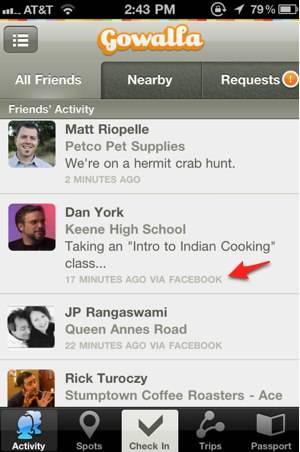Facebook now publishes its millions of user generated event listings according to the standardized microformats hCalendar and hCard, according to an announcement today by microformats community leader Tantek Çelik. That means that the venues where all these events are being held are now described in a universally standardized way.

If Facebook were to take one more step and allow websites other than the big 3 search engines to index its events listings, then that could tip the scales and move everyone in the industry to understand places around the world in the same simple terms. Joe’s Diner in Denver could be understood to be the same place across Facebook, Foursquare and a world of other location-aware applications if only one giant player in location listings had high-quality Place database marked up in the hCard microformat and publicly accessible. Is Facebook going to do that? Probably not.
On the right, you can see the front page of Gowalla’s iPhone app. Gowalla now aggregates check-ins from my contacts on its service, on Facebook and on Foursquare. You can see that the top check-in at Petco Pet Supplies is from a Gowalla friend. I could drill down through that Place and learn all about the location: its address, it’s phone number, notes and photos left, previous check-ins. But below that is a check-in from Facebook. “Keene High School?” Gowalla asks if I try to click through to the Place page. “Never heard of it!” Come on Facebook, now that you’ve described these Places in hCal – won’t you let other services come in and make a record of the places your users have gone, in a common standard format that all apps can understand?

Facebook allows Google, Bing and Yahoo to index its events listings, but not other search and indexing services. Parties seeking to index publicly available Facebook data are required to sign a legal contract and in some cases even after they are willing to do that, get the cold shoulder from Facebook headquarters.
One of the morals of the social media story is this: by giving up control over information, by sharing instead of hoarding, we might lose out on some short term advantage based on scarcity. But we will gain influence, good will and advantage by helping the larger ecosystem of innovation move much, much faster. Facebook would do well to consider that strategy with the huge database of Places it has compiled, now dressed up in standardized format, but given nowhere to go.
The addition of microformats to event listings today, without a loosening of the limitations on indexing, means little more than that one person can interact with one event at a time using a browser plug-in that few people are likely to install. So much more could be made possible.
Well-backed data startup Factual last night updated its location datasets to include something very close to full hCard support, but there’s nothing quite like a set of places defined and verified by real-world users check-ing with their phones.
Like Train Tracks to Nowhere
Data standards are believed to be important because they can be a huge enabler of innovation: it’s argued that by lowering the barriers to interoperability and collaboration through normalization of data input into whatever processes are created, standards lay the foundation of technical innovation. It’s just like when the railways in the United States adopted a standardized track width, then transcontinental transit and transport were made possible across different train networks.
To publish Place data in the standardized format, but not in an open and accessible way, is like building tracks the same width as all the others, but not only letting a few of the biggest train companies ride those rails. It takes a lot of the steam out of what could be a situations rich with potential for innovation from thousands of smaller players.
We’ve emailed Facebook to ask whether the company will be making these standardized event and place listings available to services other than Google, Bing and Yahoo. I’ll update this post when we get their response, but I would be shocked if they were in fact going to make that data available. That’s frustrating.










